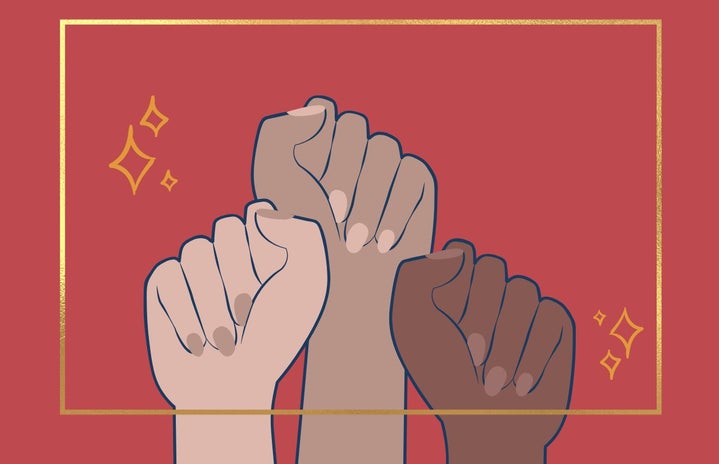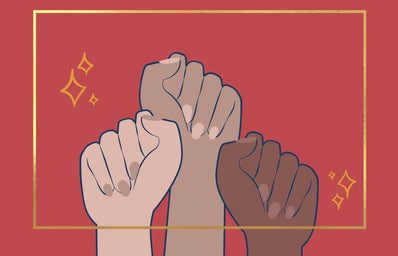Slut-shaming is a phenomenon that will continue to baffle me – the bizarre fascination which strangers, but sadly in most cases acquaintances, have with a sex life that isn’t theirs as they label you a slag for partaking in a consensual one-night stand. As Ruth Kluger so eloquently put it: “A man can have an interesting past, a woman only an indecent one”. The history student in me naturally hates a generalisation, but I would put money on the fact that every girl has been slut-shamed in one form or another at least once in her life. Even the green M&M faced accusations of promiscuity with her white go-go boots practically asking for it and therefore the change to trainers was the only viable solution to tackling the behaviour of this outrageous slag.
Much like the position of our dear “sluts” we watch getting f*cked on our screens, I was called a slut rather recently behind my back. What *is* the male fixation with doing it from behind? We are sluts from behind, there is no guilt as our faces are covered, our moans muffled. On top I’m “empowered”, in control, master of my own orgasm; from behind I’m a slut, presenting myself to be choked, spanked, f*cked. Slut-shaming is not exclusively male-dominated, however, as I discovered in a rather ironic turn of events when I was slut-shamed this summer by a male and female pair of self-proclaimed deontologists who evidently forget their “categorical imperative” in the moment (tut tut, what would dear old Kant say?). Being shamed for my sex life by a pair of individuals, who I suspect probably would have felt more at home in a different era, wasn’t exactly what I imagined would be on the itinerary for the summer school end of term class breakfast. Thankfully my faith in my generation was restored when the response was a consensus of disbelief at what they had just heard and not the snide comments I believe they were hoping for. To be fair, at least these individuals had the decency to take the missionary position in this event of slut-shaming.
In Bo Burnham’s satirical take on slut-shaming in his poem, ‘I F*ck Sluts’, he exclaims, “Boo to the nice girls. Praise be to slut fucking,” reflecting the conversations I’ve been witness to from lads on drunken nights out. If she sleeps with who she wants then call her a slut for not sleeping with you. After all, as Burnham suggests, the “nice girls” won’t do what a slut will do. That uncomfortable moment when the behaviour your male friend displays gets a pat on the back whilst you’re made to feel dirty and “ruined”. We tell ourselves we should have known better, we have been told to know better by our mothers, our grandmothers, our sisters, our girlfriends, and so we wallow in our internalised misogyny in the thought that “I am the slut who should know better than to trust, and f*ck, and suck”.
But what is the role of the ‘slut’? To be a slut is to f*ck around both physically and emotionally. They reject monogamy, seek sexual pleasure, satisfaction, and gratification: pure selfish desire in their exploration and exhibition of promiscuity and flirtation. Above all, a slut is a woman. Yet, I have met men who fit the characteristics of a slut but once I have been f*cked, I am a slut because I allowed myself to be f*cked. A slut is a willing participant who wants to f*ck or be f*cked. Isn’t sex a contract? We transact, we take from one another in a mutual understanding, we both benefit and gain, we tell each other what we like, what we want, but once again why am I the only one that is the slut?
It is rather Kafkaesque, no? A series of contradictions that get more and more ridiculous and convoluted as women try to pick apart these double standards and some men squirm as we ask if female pleasure is something only a slut may encounter? I weep for those who Burnham reassures us are only “lashing out with sexist language because he had his heart broken” and for their future partners subjected to outdated notions of sex and sexuality and bewilderment at female pleasure. If female sexual pleasure or empowerment is taboo, something only enjoyed by a slut, a concept that we are led to believe exists outside the confines of a masculinised appropriation of consent, then maybe I should be a proud slut.
As a white woman the harsh reality is I’m lucky. It pains me to hear stories from friends and fellow women alike as they simultaneously struggle with slut-shaming and being the object of racial fetishization. The label of “slut” as Burnham dictates in his performance comes from a place of backlash, hurt, entitlement. The internalised misogyny we grow up with: The sex was good, no, the sex was great, but now I must be embarrassed for wanting it. I must pretend. I can never admit. No amount of feminist literature, no reassurance from fellow girlfriends, no wisdom or theories from Plath, de Beauvoir, or flicking through “The Feminine Mystique” on yet another pursuit to achieve true “female empowerment” will relinquish me of the internal burden that maybe I am a slut … I hate myself for saying that … thus begins the vicious cycle of the slut. So, the question remains can we as women ever reclaim the word ‘slut’? We talk of ‘hot girl summer’ and our ‘hoe phase’, but is there actually a male equivalent? Or are the behaviours we label ourselves as ‘sluts’ for actually a rejection of conventional expectations surrounding sex and relationships?
The sad reality is we’ve all at some point been guilty of slut-shaming. Actually, we might as well start calling it what it actually is: internalised misogyny where we project our own insecurities, shame, and fears surrounding sex, most especially female pleasure, passed down to us by society. Think back to ‘slaggy Lindsey’ who’s only sex-related crime was stuffing her bra! Personally, I’ve found one of the best ways to come to terms with a changing mindset and challenge the internalised misogyny which may still uncomfortably linger in the mind is by splitting thoughts into ‘primary’ and ‘secondary’. The ‘primary’ is the judgement or prejudice we have been conditioned to subscribe to, for example the association of what a woman wears with her sexual behaviours or the first question to arise in celebrity nudes scandals where the woman is criticised for possessing these photos of herself on her own phone in the first place, not the vile invasion of privacy committed against her by a stranger on the internet. On the other hand, the ‘secondary’ thought which comes after is the active change/corrections we take within ourselves to challenge what we have been told, be it calling out these notions of a ‘slut’ or standing up to insidious acts of slut-shaming which take place in the workplace, our homes, universities, magazines, social media (the list goes on). Consider even some of the discomforting attempts to discredit rape victims which have taken place in court rooms, such as the case of a 17 year old victim’s thong being presented to the court by a defence barrister in Ireland which inspired a series of protests by women’s rights activists who took to sharing photos of their underwear both on social media and in public in attempt to break the link between lingerie and consent. In a practice similar to CBT, we can begin to think of reconditioning our minds as we separate our actual opinions versus what has been conditioned to us from an early age.
Despite my bravado, being called a “slut” of course is still a punch in the gut.
Written by: Amelia Craik
Edited by: Ella Dayer


